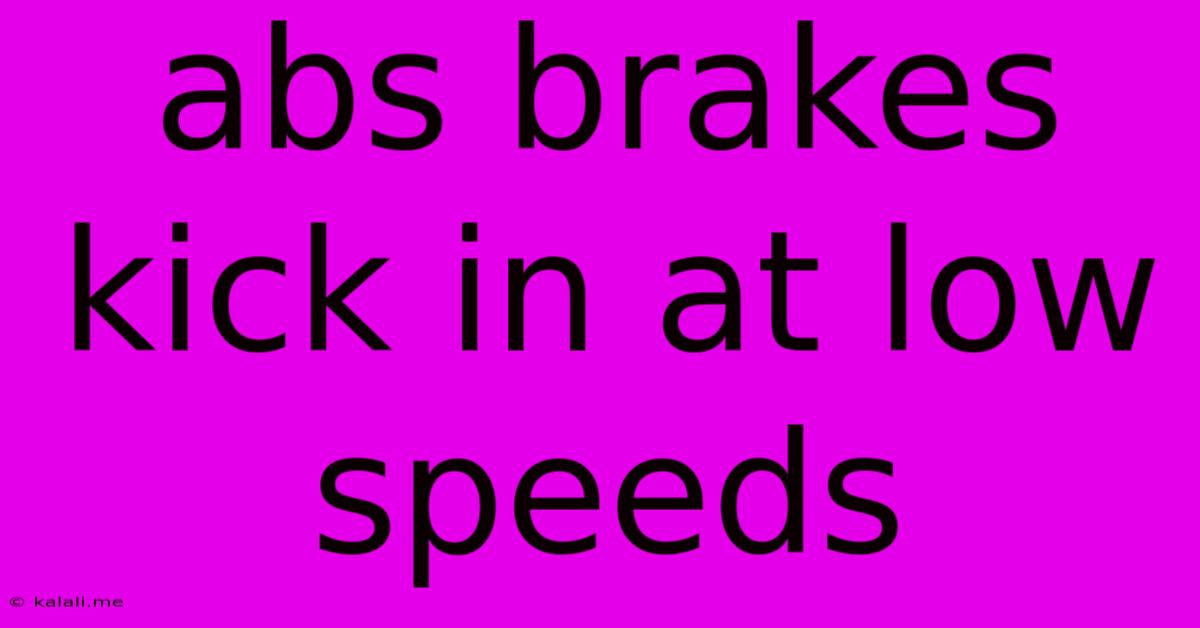Abs Brakes Kick In At Low Speeds
Kalali
Jun 03, 2025 · 3 min read

Table of Contents
Why Do ABS Brakes Kick In at Low Speeds? Understanding Your Anti-lock Braking System
ABS, or Anti-lock Braking System, is a crucial safety feature in modern vehicles. Its purpose is to prevent wheel lockup during braking, maintaining steering control and reducing stopping distances, even in challenging conditions. While most people associate ABS with high-speed emergencies, it can and does activate at lower speeds, too. This article will explore the reasons why your ABS might engage at low speeds, clarifying misconceptions and ensuring you understand this vital safety system.
Understanding How ABS Works:
ABS prevents wheels from locking up by rapidly pumping the brakes. When a wheel senses it's about to lock, the ABS module intervenes, momentarily releasing and re-applying brake pressure. This pulsating action maintains tire contact with the road, allowing you to steer around obstacles even while braking hard.
Why ABS Might Activate at Low Speeds:
Several scenarios can trigger ABS activation at low speeds, even seemingly insignificant situations:
-
Slippery Surfaces: This is the most common reason. Even slightly damp, icy, or gravelly surfaces can reduce traction enough to cause a wheel to approach lockup, triggering the ABS. This is especially true during sudden braking maneuvers, even at low speeds. Think of driving slowly on a wet road and having to brake suddenly for a pedestrian.
-
Uneven Road Surfaces: Driving over potholes, gravel patches, or other uneven road textures can cause a sudden loss of traction on one or more wheels, leading to ABS activation. The system senses the impending lockup and compensates.
-
Sudden Braking in Low Traction Situations: Even on seemingly dry roads, a sudden hard brake at low speed might cause a wheel to lose traction and trigger the ABS. This is particularly true with worn tires or vehicles with braking imbalances.
-
Vehicle Specific Factors: The sensitivity of your ABS system can vary depending on the vehicle's make, model, and even the age of the components. Some systems might be more prone to activating at lower speeds than others. This isn't necessarily a fault, just a difference in calibration.
-
Faulty ABS Sensor: While less common, a malfunctioning ABS sensor can provide inaccurate data to the ABS module, causing it to engage unnecessarily, even at low speeds. This warrants a professional inspection.
Is it Normal for ABS to Engage at Low Speeds?
Yes, it's entirely normal for the ABS to activate at low speeds in certain situations. The important thing is to understand why it's engaging. If it's happening frequently in normal driving conditions, it could indicate a problem requiring professional attention, such as a faulty sensor or brake system issue.
Distinguishing Normal ABS Activation from a Potential Problem:
If your ABS is activating frequently at low speeds without any apparent reason (e.g., slippery surfaces), it's crucial to:
- Check your tire pressure: Low tire pressure reduces traction and can trigger ABS.
- Inspect your tires: Worn or damaged tires can also lead to increased ABS activation.
- Have your brakes inspected by a mechanic: This is vital to rule out any underlying brake system issues.
In Conclusion:
ABS is designed to enhance safety across a range of speeds. Its activation at low speeds, often due to reduced traction, is a normal part of its function. However, frequent or unexplained activation warrants professional attention to ensure your braking system is operating correctly and safely. Understanding how your ABS works and its potential triggers will increase your confidence and safety on the road.
Latest Posts
Latest Posts
-
4 Wire To 3 Wire Plug
Jun 05, 2025
-
I Driving The Car And He
Jun 05, 2025
-
John And Peter Running To The Tomb
Jun 05, 2025
-
Mil Light On But No Codes
Jun 05, 2025
-
Over Easy Vs Over Medium Eggs
Jun 05, 2025
Related Post
Thank you for visiting our website which covers about Abs Brakes Kick In At Low Speeds . We hope the information provided has been useful to you. Feel free to contact us if you have any questions or need further assistance. See you next time and don't miss to bookmark.